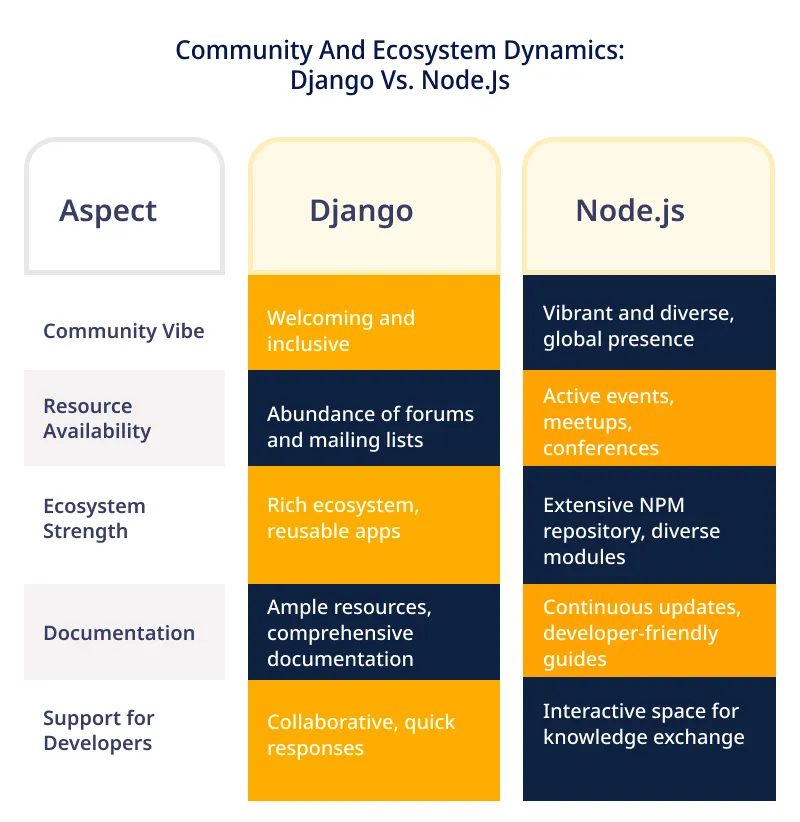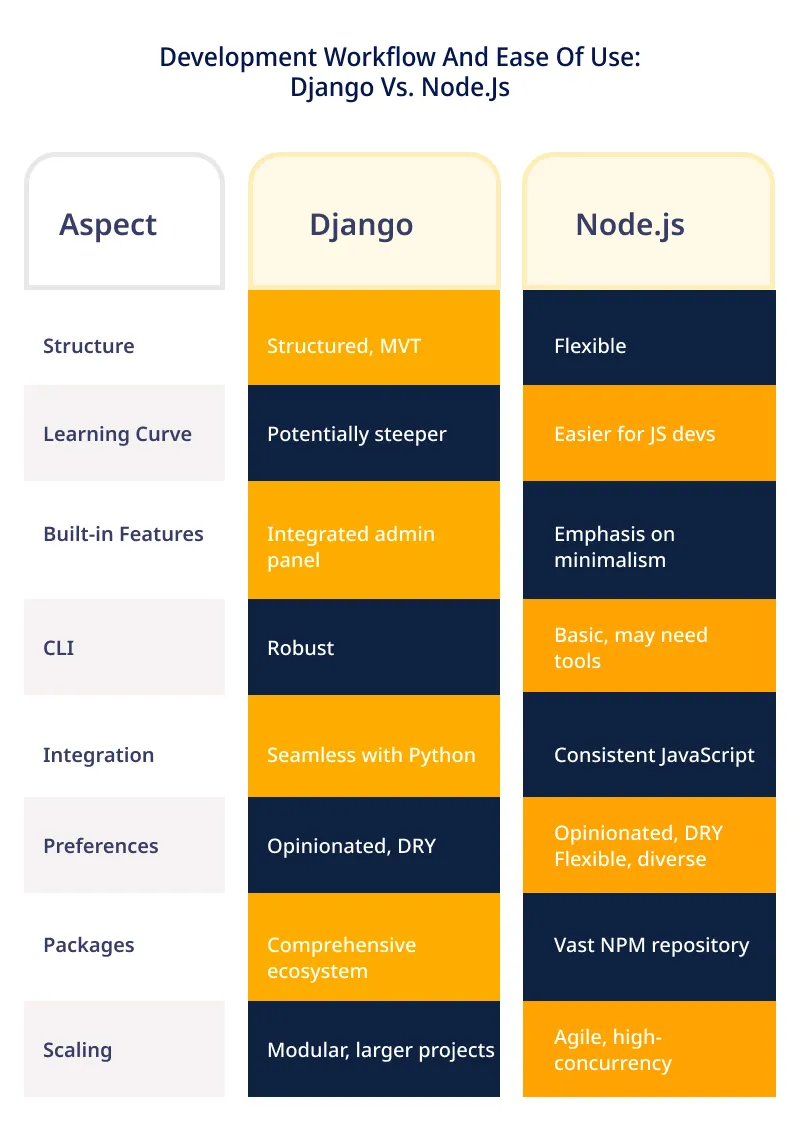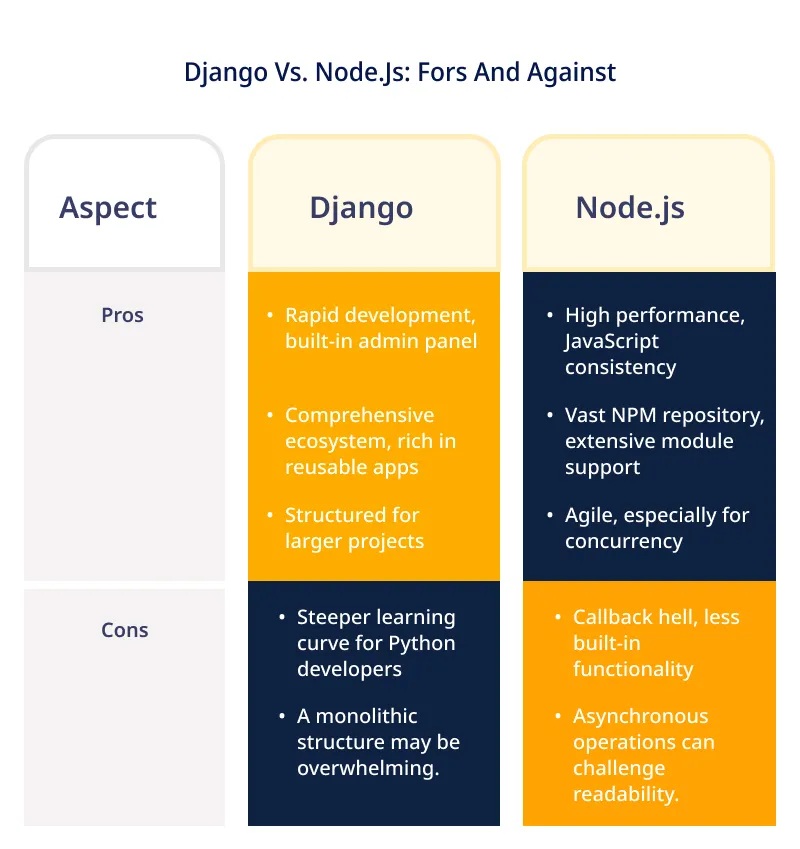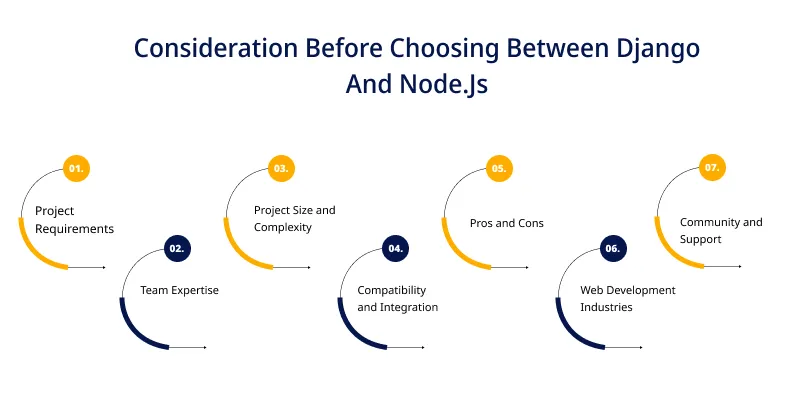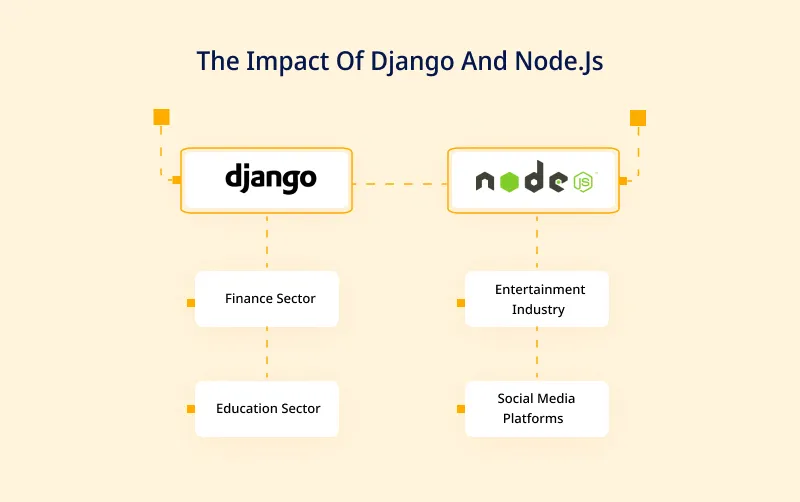What backend technology should you choose – Django or Node.js?
As a business leader exploring web development platforms, you may be asking yourself this question.
Both Django and Node.js have their advantages, so let’s break it down. When it comes to performance, Django may have a slight edge since it compiles to optimized bytecodes while Node.js is interpreted at runtime.
However, Node.js wins when scaling horizontally across multiple servers thanks to its event-driven, non-blocking I/O model. Ultimately, both can deliver excellent performance that is more than adequate for most applications.
On the development side, those with Python skills may find Django more approachable. Node.js offers JavaScript throughout the full stack, appealing to front-end developers looking to use one language.
Both benefit from great documentation, community support, and abundant libraries, though.
In this Weblog, we dive deeper into Django vs Node.js for key criteria – performance benchmarks, scalability comparisons, ease of use assessments, and more.
We hope this analysis equips business leaders to choose between these two capable web development platforms. The decision depends significantly on your specific application and team’s skills.
Understanding The Basics
Choosing the proper framework is crucial when it comes to web development. Let’s understand the basics of Django and Node.js – two stalwarts that often stand at the crossroads of this decision-making process.
Django
Django is the same as the architect of the web – a Python-powered framework that streamlines development, making it faster and more maintainable.
Strengths
- Batteries Included: Django comes pre-equipped with various features, from authentication to ORM (Object-Relational Mapping).
- Rapid Development: Its “don’t repeat yourself” (DRY) philosophy promotes efficiency, reducing redundancy in code.
Node.js
Node.js, the JavaScript runtime, is versatile and efficient for server-side applications.
Strengths
- Asynchronous Operations: Node.js thrives on non-blocking, asynchronous operations, making it lightning-fast.
- Event-Driven Architecture: Its event-driven architecture ensures responsiveness and scalability.
Scalability Django vs Node.js
1. Node.js Scalability
- Single-Threaded, Multi-Tasking: Node.js handles multiple tasks simultaneously, ideal for handling numerous concurrent connections.
- Microservices Friendly: Its lightweight, modular nature makes it a go-to for scalable, microservices-based architectures.
2. Django’s Scalability
- Robust Foundation: Django’s MVT (Model-View-Template) structure provides a solid foundation for scalable applications.
- Decoupled Components: Its modular design allows scaling specific components as needed.
Understanding these basics is pivotal in comprehending the web development comparison landscape.
Whether you’re looking to hire Django developers or exploring Node.js development services, grasping the foundations sets the stage for an informed decision.
Let ValueCoders help you find your perfect web dev match!
Performance Comparison
The performance of your chosen framework can be a game-changer when it comes to web development.
Let’s compare the performance of Django vs. Node.js, exploring their speed, efficiency, and scalability.
Django’s Performance
- Structured Speed: Django, a Python framework, offers structured and optimized code, ensuring efficient execution.
- Complex Operations: Ideal for applications with complex business logic, Django’s performance shines through.
Node.js Performance
- Lightning-Fast Execution: Node.js, with its non-blocking, asynchronous operations, delivers rapid execution.
- Event-Driven Efficiency: The event-driven architecture allows Node.js to handle multiple tasks simultaneously, enhancing overall performance.
Scalability in Django vs Node.js
1. Scalability in Django
- Robust Scaling Foundation: Django’s MVT structure provides a robust foundation for scalable applications.
- Modular Growth: The modular design allows scaling specific components, ensuring flexibility as your project expands
2. Scalability in Node.js
- Concurrency Mastery: Node.js, with its single-threaded, event-driven model, excels in handling many concurrent connections.
- Microservices-Friendly: Its lightweight, modular nature makes Node.js a top choice for scalable, microservices-based architectures.
Choosing Between PHP and Node.js
- Node.js for Real-Time Applications: If real-time features are crucial, Node.js shines, making it preferable for chat applications and gaming platforms.
- PHP for Traditional Web Apps: PHP, on the other hand, is well-suited for traditional web applications, offering stability and broad compatibility.
As you explore web development, understanding the performance dynamics of Django and Node.js is key to reaching the right decision.
Whether you’re eyeing top Node.js development companies or contemplating PHP or Node.js, this performance comparison sets the stage for informed decision-making.
We're experts in both Django and Node.js, making your brand outstanding.
Development Workflow and Ease of Use
Now, let’s understand Django and Node.js, examining their ease of use and the paths they pave for developers.
Django’s Development Workflow
Structured Project Layout: Django offers a structured layout similar to a well-organized workspace, promoting clarity and maintainability. Developers familiar with Python find Django’s conventions intuitive, reducing the learning curve.
Integrated Features: The inclusivity of Django, with integrated features like ORM and admin panels, streamlines the development process. A robust CLI (Command Line Interface) simplifies everyday tasks, enhancing overall efficiency.
Node.js Development Workflow
Flexibility and Adaptability: Node.js, like a versatile toolkit, provides flexibility in project structure, catering to diverse development preferences. Its non-blocking nature allows for concurrent operations, fostering adaptability in handling various tasks.
NPM and Package Management: NPM acts as a marketplace, simplifying dependency management and facilitating easy integration of third-party packages.
The node package ecosystem contributes to Node.js’ agility, allowing developers to extend functionalities effortlessly.
Also Read: 20+ Top Web Development Frameworks
Pros and Cons Django vs Node.js
Django’s Pros
- High-level Abstraction: Django’s high-level abstractions facilitate rapid development, which is ideal for projects with tight deadlines.
- Built-in Admin Panel: The built-in admin panel is a standout feature, offering a user-friendly interface for managing applications.
Django’s Cons
- Learning Curve: Django may initially pose a steeper learning curve for developers unfamiliar with Python.
- Monolithic Nature: The monolithic structure, while organized, might be overwhelming for smaller projects.
Node.js’s Pros
- Speed and Performance: Node.js, with its non-blocking architecture, excels in handling concurrent tasks, ensuring high performance.
- JavaScript Everywhere: The ability to use JavaScript throughout the stack provides consistency, especially for full-stack developers.
Node.js’s Cons
- Callback Hell: Asynchronous operations can lead to callback hell, challenging code readability in complex scenarios.
- Less Built-in Functionality: Unlike Django, Node.js may require additional third-party packages for specific functionalities.
Hire Node.js Developers and Web Development Framework Comparison
When considering hiring Node.js developers, familiarity with JavaScript becomes a universal advantage.
The diverse skill set within the Node.js community ensures a pool of talented professionals.
As you traverse the web development framework comparison landscape, the ease of use becomes a compass guiding you through efficient workflows.
Whether exploring the pros and cons of Django vs. NodeJS or planning to hire Node.js developers from top Node.js development companies, understanding the web development comparison journey is key to a successful expedition.
ValueCoders will help you decide - Django's strength or NodeJS's speed!
Community and Ecosystem Support
The web development process involves not just code but a community – your digital co-supporter.
Let’s find out about the support in the Django and Node.js ecosystems.
Django Community
- Inclusivity and Support: Django’s community is like a welcoming neighborhood, embracing developers of all levels with open arms. Ample support forums and mailing lists foster an environment where queries find quick and helpful responses.
- Rich Ecosystem: Django boasts a rich ecosystem akin to a bustling marketplace, offering many reusable apps and packages. Regular updates and a dedicated team ensure the framework stays current and secure.
Node.js Community
- Vibrant and Diverse: Node.js community is a bustling city square, rich with diverse developers collaborating and sharing insights. Events, meetups, and conferences create an interactive space for knowledge exchange.
- Node Package Manager (NPM): NPM, the Node.js package manager, acts as a well-stocked library, providing a vast array of modules and packages. Continuous contributions and updates showcase the dynamism of the Node.js ecosystem.
- Global Presence: Node.js, like a well-traveled ambassador, has a global presence, attracting developers from various corners. Top Node.js development companies contribute to and benefit from this worldwide collaboration.
Scalability in Django and Node.js
1. Django’s Collaborative Scaling
- Django’s scaling journey is a collaborative approach where each component can be scaled independently.
- The community actively shares insights on scaling challenges and solutions.
2. Nodejs Agility in Scaling
- Node.js excels in rapid scaling, particularly in scenarios with high concurrent connections.
- The community’s collective wisdom on scalability issues makes it a go-to resource for Node.js developers.
Node.js vs Django for Startups
Django and Node.js have proven to be startup-friendly, offering agility and scalability.
Community discussions often examine the nuances of choosing the proper framework for the startup terrain.
During the web development comparison, consider the communities as your compass, guiding you through challenges and celebrating victories.
Whether you’re exploring the advantages of using NodeJS or eyeing top Node.js development companies, the strength of the community is a key pillar supporting your journey.
Also Read: How To Make A Choice Between NodeJS And Python
Decision-Making Factors
Choosing the right web development framework involves a thoughtful consideration of various factors.
To help the decision-making process, here are some crucial elements in the web development comparison of the Django vs. Node.js debate.
1. Project Requirements
- Django’s Strengths: Well-suited for projects with complex business logic and structured development needs. It is ideal for applications where rapid development and a built-in admin panel are paramount.
- Node.js’s Edge: Excels in real-time applications and scenarios requiring high concurrency. Well-suited for projects demanding flexibility in project structure and adaptability.
2. Team Expertise
- Django Development Team: Ideal when your team is well-versed in Python and Django’s conventions. The learning curve might be smoother for teams with prior experience in high-level abstractions.
- Node.js Development Team: Suited for teams familiar with JavaScript, especially advantageous for full-stack developers. Teams accustomed to asynchronous, event-driven paradigms can leverage Node.js effectively.
3. Project Size and Complexity
- Django for Robust Applications: Suitable for larger, more complex projects where the monolithic structure offers organizational benefits. Well-aligned with projects requiring extensive built-in features and a comprehensive framework.
- Node.js for Agility: Agile and scalable, making it a solid choice for smaller to medium-sized projects. Particularly advantageous for projects where rapid scaling and handling concurrent connections are critical.
4. Compatibility and Integration
- Django’s Integration: Seamless integration with Python libraries and packages enhances compatibility. Well-suited for projects requiring integrations with existing Python-based systems.
- Node.js’s JavaScript Everywhere: Consistency in using JavaScript throughout the stack promotes smooth integration. Ideal for projects with a focus on JavaScript-centric environments.
Whether you’re considering the pros and cons of Django vs NodeJS, planning to hire Node.js developers from top Node.js development companies, or evaluating your team’s expertise, a thorough understanding of these factors ensures a well-informed decision on the path forward.
Whether you’re considering the pros and cons of Django vs NodeJS, planning to hire Node.js developers from top Node.js development companies, or evaluating your team’s expertise, a thorough understanding of these factors ensures a well-informed decision on the path forward.
We optimize Django's structure or NodeJS's speed for your success.
Real-World Use Cases and Industries
Understanding the significance of Django and Node.js in real-world scenarios of web development comparison can be a guiding light in the vast web development landscape.
Let’s look into the diverse industries and use cases where these frameworks significantly impact.
Django in Action
- E-commerce Platforms: Django proves its mettle in building robust and scalable e-commerce platforms, handling complex transactions seamlessly. Features like ORM and a built-in admin panel simplify product management.
- Content Management Systems (CMS): The structured nature of Django makes it an excellent choice for developing content management systems, ensuring organized content creation and delivery. Customizable admin interfaces enhance user experience.
- Healthcare Applications: Django’s security features and ability to handle intricate data models are valuable for developing robust applications in the healthcare industry. Compliance with data privacy regulations is an added advantage.
Node.js in Action
- Real-Time Applications: Node.js excels in real-time applications like chat applications and collaborative tools, where immediate data updates are crucial. Its event-driven architecture ensures responsiveness.
- Streaming Services: Node.js handles concurrent connections efficiently, delivering a seamless streaming experience for streaming platforms and online media services. Scalability is a key factor in accommodating varying user loads.
- Gaming Platforms: Node.js is a preferred choice for building gaming platforms that require real-time interactions and updates. Its non-blocking nature enhances the responsiveness of gaming applications.
Industries Benefiting from Django and Node.js
- Django’s Impact: Finance Sector: Django’s security features and ability to handle financial data make it suitable for developing robust financial applications.
- Education Sector: Educational platforms leverage Django for organized content delivery and management.
- Node.js’s Influence: Entertainment Industry: Node.js plays a significant role in building interactive and real-time applications for the entertainment industry.
- Social Media Platforms: The event-driven nature of Node.js is well-suited for social media platforms, facilitating instant updates and interactions.
Considering the web development framework comparison, understanding the real-world applications of Django and Node.js unveils their versatility.
Whether you’re exploring industries such as finance, healthcare, or entertainment or planning to hire Node.js developers from top Node.js development companies, these use cases provide valuable insights into the practical strengths of each framework.
Summing Up
The Node.js vs Django performance analysis emerges as a crucial compass in the search for the ideal framework.
Like a unique tool, each offers distinct strengths—Django excels in structured scenarios, while Node.js thrives in real-time dynamism.
As we explore this web development comparison process, considering Custom Web App Development Services, the choice aligns with project complexities.
Whether it’s the robustness of Django or the agility of Node.js, the decision is nuanced. For those planning web development, the key lies in the framework and expertise.
Hire Web Application Developers from ValueCoders with a skill set tuned to the chosen path.
Performance analysis plays a crucial role in web development; performance analysis leads to a wise decision, simplifying technology and talent for a successful composition.

